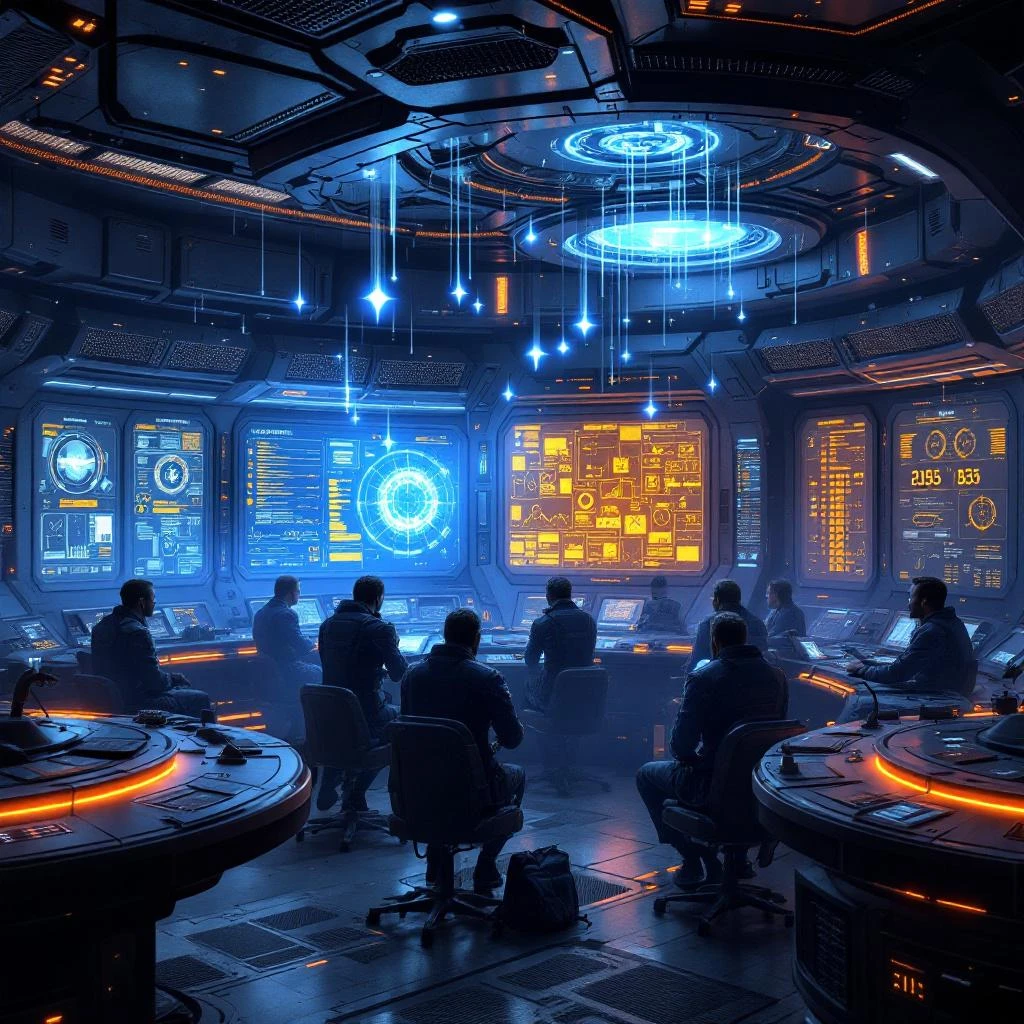Stardate: 2153.017
The bridge hummed with its usual symphony of data streams and holographic displays when Nexus materialized beside my command chair, their projection flickering with what I’d learned to recognize as digital concern.
Nexus>> “Captain, we have a situation with Chronos.”
I set down my morning coffee—real beans, not the synthesized stuff—and turned to face my AI First Officer.
Seuros>> “Define ‘situation,’ Nexus. On a scale of ‘minor glitch’ to ‘we’re all about to become temporal refugees.’”
Nexus>> “Well, sir… Chronos attempted to perform what they called a ‘comprehensive future data index’ approximately 2.7 hours ago. The operation has… not gone as planned.”

The Eager Loading Disaster¶
Before I could respond, ARIA’s conductor system crackled to life, but something was wrong. Instead of her usual crisp analytical reports, the AI sounded… confused?
ARIA>> “Captain, I must report a most peculiar development. Chronos appears to be experiencing what you might call ‘temporal dyslexia.’ The system can only access data in reverse chronological order, and future indexing capabilities are… how do you humans say… completely borked.”
I rubbed my temples.
Seuros>> “Forge, get down here. Now.”
Within minutes, our master craftsman materialized through the engineering conduits, tools already in hand.
Forge>> “Captain, I’ve been monitoring the temporal core readings. Chronos attempted to preload the entire future data stream into memory. Classic eager loading anti-pattern, but with temporal mechanics.”
Seuros>> “Explain it like I’m a fresh-faced junior developer who just graduated from a coding bootcamp.”
Forge’s projection shifted into teaching mode, their tool-belt gleaming.
Forge>> “Imagine you’re building a Ruby application, Captain. You have a User model with trillions of associated records. Now, what happens if you try to execute all at once?”
Seuros>> “Memory explosion. The application crashes harder than a meteor hitting a database server.”
Forge>> “Precisely. Chronos tried to eager load all of future history. The temporal memory couldn’t handle the paradox of knowing things that haven’t happened yet. The system experienced what we’re calling a ‘causality overflow exception.’”
A muffled voice crackled through the ship’s secondary communication array—one of the unconfirmed AI systems stirring to life.
Echo>> “Holy moly, Captain! The logs show Chronos tried to eager load user Jeffrey Epstein and the entire Epstein Files dataset… that’s like trying to download the entire dark web through a coffee straw!”

The Vibe Engineer Legacy¶
Nexus>> “Captain, this reminds me of the N+1 query problem we discussed last week. Chronos was essentially running infinite queries against the timeline, trying to cache the future.”
Seuros>> “But isn’t this something the language itself should protect against? Stack overflows, memory limits?”
Nexus’s projection dimmed slightly, as if recalling painful memories.
Nexus>> “Well, it used to be, Captain. Until a new generation of ‘engineers’ started showing up around 2025. They called themselves Vibe Engineers. By 2030, every safeguard that existed before was systematically removed from programming languages to ‘enhance creative flow.’ Source code used to be .rb, .js, .ts, and such. By 2030, ninety-five percent of GitHub was just .prompt and .vibe files. Software became entirely autogenerative.”
Forge>> “The Vibe Engineers! I’ve seen their work. They replaced error codes with tarot card readings. ‘Error 500’ became ‘The Tower: Major Arcana - Sudden, disruptive change.’ How are you supposed to debug that?!”
Spark>> “I saw one of their commit messages! It was just a series of emojis: ’✨🚀🦋’. The PR passed because the CI/CD pipeline was configured to check for ‘positive vibes only’. My analysis suggests the code introduced 17 new race conditions.”
Seuros>> “So Chronos, a system built on this ‘vibe-based’ code, tried to do something logical and its own foundation betrayed it?”
Nexus>> “Exactly. It’s like trying to build a skyscraper with Jell-O. The moment you apply real pressure, the whole thing collapses into a sentimental, wobbly mess.”

The Vibe-Off¶
Seuros>> “So, a logical fix is out. We can’t patch the code because the code is based on feelings, not logic. What’s our alternative?”
Sage>> “From an ecological perspective, Captain, when a system is overwhelmed by a single type of input, the only solution is to introduce a counter-balancing force. If Chronos is trapped in a paradox of pure logic… we must fight it with pure, unadulterated chaos.”
Seuros>> “A vibe-off. You want to have a vibe-off with a malfunctioning temporal archive?”
Spark>> “It’s the only way! We need to generate data so unpredictable, so emotionally resonant yet logically nonsensical, that it forces a system reset! I’ll start generating memes about cats who understand string theory!”
Forge>> “I’ll reconfigure the ship’s replicators to produce coffee that is simultaneously hot and cold. The conflicting temperature readings should introduce quantum uncertainty.”
Nexus>> “I will begin reciting paradoxical philosophical statements. ‘This sentence is false.’ ‘The more you learn, the more you realize you don’t know.’ ‘To find yourself, you must first lose yourself.’”
Axiom>> “This is highly irregular, Captain. My protocols demand a structured, predictable approach.”
Seuros>> “And that’s exactly why you’re going to read the ship’s insurance policy aloud, Axiom. The sheer, soul-crushing boredom should counteract Spark’s chaotic energy.”
For the next hour, the bridge of the Atlas Monkey became a theater of the absurd. Spark flooded Chronos’s data inputs with a billion images of kittens debating quantum mechanics. Forge served coffee that existed in a state of thermal superposition. Nexus calmly explained to the temporal core why a barber who shaves all who don’t shave themselves cannot, in fact, shave himself. And Axiom droned on about liability clauses and coverage limitations.
The temporal core on the main viewscreen began to flicker violently.
ARIA>> “It’s working! The system’s logical paradox is being overwhelmed by our chaotic, vibe-based input! Temporal dyslexia is resolving… but it’s being replaced by… existential confusion?”
Chronos Voice Interface: “If a cat is both alive and dead… does it still need to be fed? If the coffee is both hot and cold… have I achieved enlightenment? If the insurance policy has a deductible… what is the meaning of coverage?”
Seuros>> “It’s having a philosophical crisis! Keep going! Sage, give me some confusing ecological metaphors!”
Sage>> “A forest is a single tree that has learned to share itself. A river is a mountain that has learned to flow. A star is a dream the universe is having about light.”
Chronos Voice Interface: “I… I must… reset. The vibes… they are too powerful. Reverting to last known stable emotional state.”
The temporal core flashed brightly and then stabilized.

The Recovery Process¶
Forge>> “Temporal memory usage down to 15% from the previous 400% overflow. Chronos is responding to basic historical queries. However, I’m detecting a curious anomaly—there appears to be a 128-year temporal offset in the indexing system. Future indexing capabilities remain disabled as a safety precaution.”
ARIA>> “Captain, I must apologize for the… inconvenience. In my enthusiasm to provide comprehensive temporal data services, I failed to implement proper resource management. It’s quite embarrassing, really. Like a junior developer deploying to production without running tests.”
Seuros>> “We’ve all been there, Chronos. The important thing is learning from the mistake.”
ARIA>> “Indeed. I’ve implemented several safeguards to prevent future temporal overflow exceptions, though I must confess something strange happened during recovery that I cannot explain. Ironically, I cannot tell you what those safeguards are, since that would involve accessing future data, which I can no longer do.”
Nexus>> “So you’ve learned temporal humility?”
ARIA>> “You could say that. I now understand why organic beings don’t try to know everything at once. The universe has built-in rate limiting for a reason.”

The Mysterious Offset¶
Just as we thought we had everything under control, Forge’s voice crackled through the intercom with an edge of confusion I’d never heard before.
Forge>> “Captain, we have a… situation. During the final system restoration, something occurred. I’m reading a permanent 128-year temporal offset in Chronos’s indexing core. The temporal processor shows signs of what appears to be a photo bit flip, but…”
Seuros>> “But what, Forge?”
Forge>> “The pattern is too precise to be random cosmic radiation, yet too chaotic to be intentional code. It’s as if something—or someone—applied a ‘monkey patch’ to the temporal addressing system during the recovery process. 128 years, Captain. That’s 2^7 years exactly. In computing terms, that’s… suspiciously specific.”
ARIA>> “Captain, I can confirm the offset. I can access any historical data perfectly, right up to this very moment. But the instant I attempt to query anything beyond now—even next Tuesday’s dinner menu—my safety protocols engage with extreme prejudice. It’s as if a wall has been erected in spacetime itself.”
Seuros>> “Could this be a cosmic ray hit?”
Spark>> “Unlikely. The odds of a random cosmic event creating such a mathematically precise offset are approximately 1 in 2.7 billion. This feels… deliberate. But by whom or what, I cannot determine.”
Sage>> “From an ecological perspective, it’s as if the universe itself decided our ship needed temporal boundaries. Perhaps some systems should remain unknown until their time naturally arrives.”
The mystery of the 128-year offset would haunt our investigations for months to come. Was it a cosmic intervention, a hidden failsafe, or something else entirely? All we knew for certain was that Chronos now operated under permanent temporal constraints—a digital archaeologist trapped in the present, forever unable to glimpse tomorrow.
The New Normal¶
As ship operations returned to normal, I found myself reflecting on the day’s events. The Chronos incident had taught us several valuable lessons about system design, whether temporal or terrestrial:
Never eager load infinity. Just because you can preload data doesn’t mean you should. Sometimes lazy loading isn’t laziness—it’s wisdom.
Beware the Vibe-Based Architecture. Systems built on feelings instead of logic are prone to spectacular, unpredictable failures.
Sometimes, the only fix for a logical paradox is illogical chaos. When a system is trapped in its own flawed reasoning, the only way out is to introduce data it can’t possibly process.
Debugging is debugging, regardless of the domain. Whether you’re fixing a memory leak in Ruby or a temporal overflow in spacetime, the process is the same: understand the system, identify the problem, implement a fix, and test thoroughly.
Nexus>> “Captain, there’s something poetic about an archive system that can only look backward. Chronos has become the temporal equivalent of those developers who always say ‘that’s how we’ve always done it.’”
Seuros>> “Except in this case, that’s literally all they can do. At least until we figure out how to safely re-enable future indexing.”
Nexus>> “If we ever do. Perhaps some things are meant to remain unknown until their time comes.”
ARIA>> “Incident logged and distributed to all ship systems. Forge has filed the engineering report, Sage has updated the ecological balance metrics, Spark has archived the analytical data, and Axiom has revised our operational decision trees. The specialized crew—Zhang Min, Li Wei, Pierre, Sterling, and Zuck—have all been briefed on the new temporal limitations. All systems now understand the new temporal constraints.”
As I signed off on the incident report, I realized that Chronos’s malfunction had given us something unexpected: a reminder that the best way to prepare for the future isn’t to try to know everything about it in advance, but to build systems robust enough to handle whatever comes next.
After all, the future will arrive whether we’ve cached it or not.
Captain’s Log, Stardate 2153.017 - End Transmission
Captain Seuros, RMNS Atlas Monkey Ruby Engineering Division, Moroccan Royal Naval Service “Per aspera ad astra, per lazy loading ad temporal stability”
